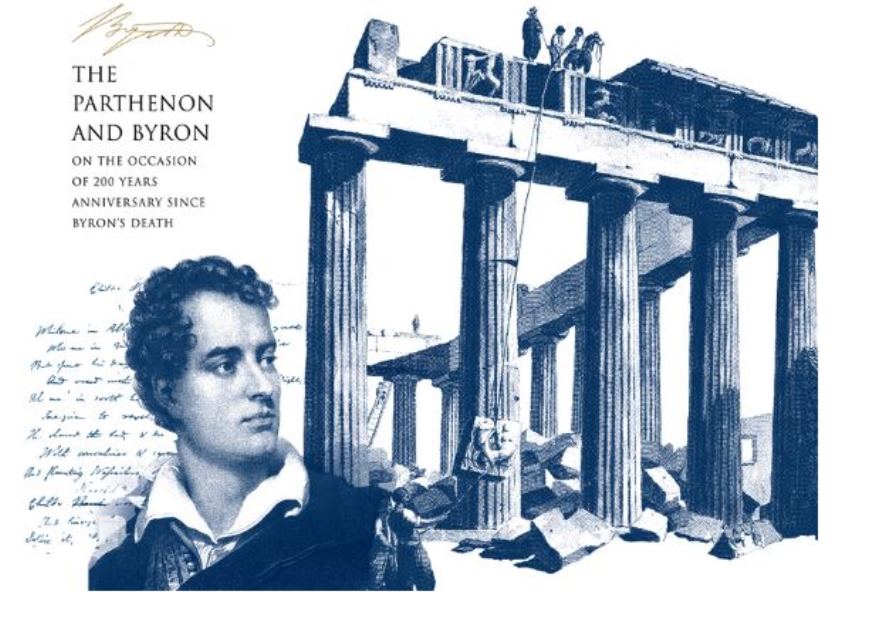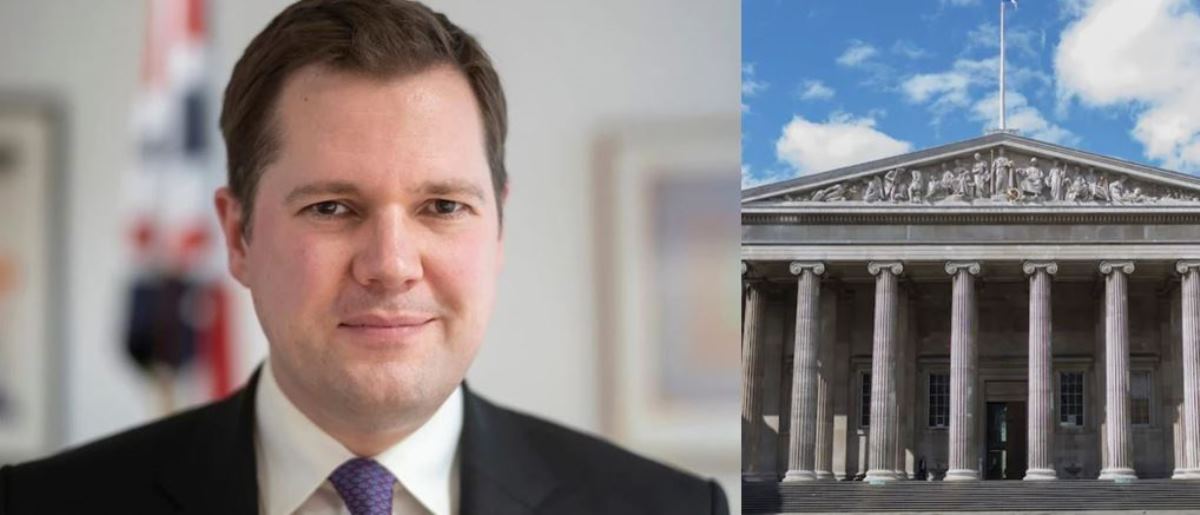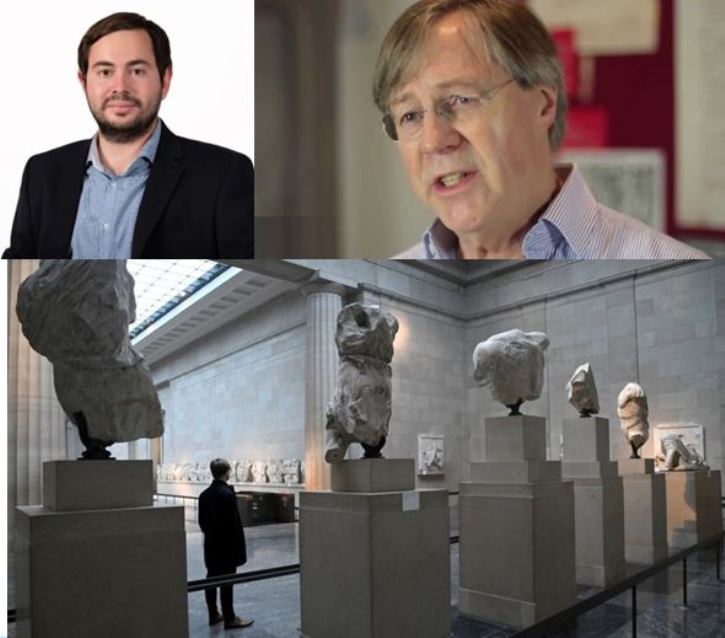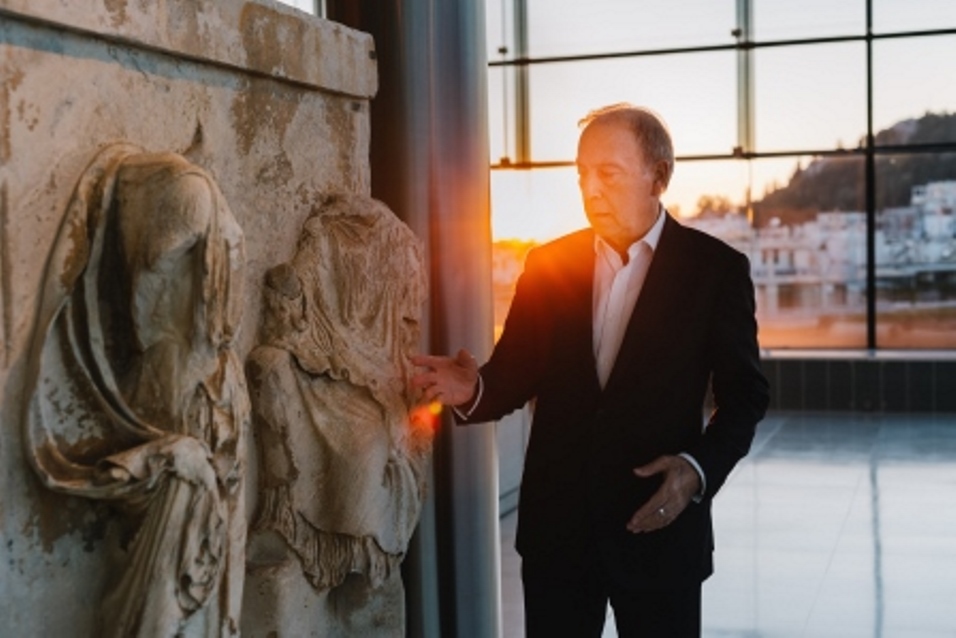Greece is the Word
I have a modest proposal that might simultaneously celebrate the life of Christopher Hitchens, strengthen Britain’s low stock in Europe and allow us to help a dear friend in terrible trouble.
Perhaps the most beautiful and famous monument in the world is the Doric masterpiece atop the citadel, or Acropolis, of Athens. It is called the Parthenon, the Virgin Temple dedicated to Pallas Athene, the goddess of wisdom who gave the Greek capital its name.
The Acropolis contains other temples and represents in the minds of scholars, historians and all who care about our past and the source of our civilisation, the pinnacle of Athens’s Golden Age under the leadership of Pericles; that period of peace between the wars against Persia which they won, and the wars against their neighbours Sparta, which they lost.
For students and lovers of architecture the Acropolis (over which I made a spectacular fool of myself some years ago) will always remain one of the most perfect examples of the Doric order ever constructed. The Romans and Arabians later added arches, ogees, domes, pendentives, barrelled vaults and squinches to the basic elements of architecture, but the Parthenon’s grace has never been surpassed. Its influence is all around us. Pillars, pilasters, porticos, pediments, architraves, entablatures, triglyphs and metopes may sound strange but we see them every day in high street buildings, town halls, 18th century churches, squares and crescents. Some people who spot trains or birds are called sad. I am a sad corbel, buttress and apse spotter – one who loves that there is a name for everything in architecture, a full and rich anatomy.
Doric elements were not the only thing that came from Greece. 5th century BC Athens was a city state that gave us Aristotle and his devising of logic, categories, ethics and poetics; Plato and Socrates led ceaseless quests for the discovery of the truth behind people, phenomena and politics. Their refusal to take as true any baseless, unprovable assertions made by priests, tyrants and hierarchs but instead to examine honestly from first principles took nearly two millennia to be rediscovered by the renaissance and then enlightenment philosophers who shaped our modern world very much with Periclean Athens in mind. Euclid and Archimedes are to this day heroes to all mathematicians and engineers. Their blend of rationalism and empiricism is at the heart of all science and sense. The sheer magnificent beauty of Euclidian geometric theorems and their proofs, has never, most mathematicians would agree, been surpassed.
The duty of Athenian citizens to play a part in justice through the tribunals on the Areopagus Hill was taken seriously, as was democracy in the form of regular voting: there was even an agreed assumption that theatre as a total art form that combined mask, dance, poetry, drama, history, music and religious ceremony was an essential element of public life and formed part of an open analysis of Athenian identity. As Nietzsche pointed out in his supreme The Birth of Tragedy, the Greek people had gone from tribal blood feuds, war and savagery to a peak of civilisation in a very short time indeed. Nietzsche chose the Greek gods Apollo and Dionysus as representatives of the two sides of the Greek (and of course all human) character. One part harmonious, reasonable, artistic, musical, mathematical and idealistic, the other consumed by appetite, lusts and loss of reason through desire, greed and ambition. Whether we call these Freud’s ego and id or Forster’s prose and the passion, which we must “only connect”, no civilisation I can think of seems so clearly to display through its art, rhetoric, philosophy and politics just what it is to be a human, a social and collective being, what Aristotle himself called in a phrase almost worn away by universal use, “a political animal”.
Of course we are not talking about an ideal society. Slavery, the subjugated role of women, open paederasty and xenophobia, helotry and harlotry – these are not things wholly in tune with the temper of our own times. Read E. R. Dodds’s masterly The Greeks and the Irrational and you will see they weren’t all algebraic geniuses with a bent for brilliant oratory and logical exposition. But Athenian education, open enquiry, democracy, justice and a harmony of form in sculpture and architecture were quite new to our world and indeed their ability to question themselves is one of the things for which we are most indebted to them.
We have them to thank for the Olympic Games too, and the next Olympiad of the modern age will of course be held in London in 2012, and very excited and pleased about that I am. Excited and pleased because I love sport and always and automatically want to line up on the opposite side of cynics, curmudgeons, wet-blankets, pessimists, and (literally in this case) spoilsports.
I am also excited and pleased because the occasion — the largest regular gathering human beings on the face of the planet — offers…
A) a remarkable opportunity to appease the dead spirit of the great Hitchens
B) to make up to some small degree for our recent devastating and pathetic humiliation in Europe
C) to redress a great wrong and
D) to express our solidarity with, affection for and belief in Greece and the ideals it gave us.
The Hellenic Republic today is in heart-rending turmoil, a humiliating sovereign debt crisis has brought Greece to the brink of absolute ruin. This proud, beautiful nation for which Byron laid down his life is in a condition much like the one for which he mourned when they were under the Ottoman yoke in the early nineteenth century, taking time off from the comic ironic tones of his ottava rima masterpiece Don Juan to insert this mournful threnody….
The isles of Greece, the isles of Greece!
Where burning Sappho loved and sung,
Where grew the arts of war and peace,
Where Delos rose, and Phoebus sprung!
Eternal summer gilds them yet,
But all, except their sun, is set…
And where are they? And where art thou?
My country? On thy voiceless shore
The heroic lay is tuneless now—
The heroic bosom beats no more!
And must thy lyre, so long divine,
Degenerate into hands like mine?
‘Tis something, in the dearth of fame,
Though linked among a fettered race,
To feel at least a patriot’s shame,
Even as I sing, suffuse my face;
For what is left the poet here?
For Greeks a blush–for Greece a tear….
Two years ago a new and beautiful Acropolis museum was completed, allowing visitors a much more intelligent enlightening, captivating and informative journey through the history and meaning of the Acropolis than the rather rocky hillside rambles of the past.
A year earlier, in 2008, the Italian and Greek Presidents had taken part in a ceremony in which a fragment of marble sculpture taken from Greece and left in Italy 200 years earlier was returned to Athens. This small fragment had been taken by the British Ambassador to the Ottoman Empire, Lord Elgin.
The greater part of the haul was taken to England where they have been housed in the British Museum in London since 1816 under the now highly charged name of the Elgin Marbles. Even at the time plenty of Britons thought the Ottoman Empire’s granting permission to take so many elements of the Parthenon (and the stunning Erectheum, the temple with its famous caryatids further down the hill) away from their home and into London was little short of looting.
MARBLES
What has all this to do with Christopher Hitchens, polemicist, shamer of Clinton, Kissinger and Mother Teresa, champion of Orwell and Payne, scourge of tele-evangelists and mountebanks everywhere? Well, in 1997 Hitchens wrote a book called The Parthenon Marbles, the Case for Reunification. In it he lays out how, inspired by reading Colin MacInnes (of Absolute Beginners fame) on the subject, he threw himself into finding out more about the marbles and came to what he saw a frankly irrefutable case for their return.
It was, as the author Simon Raven pointed out, the Greeks who maintained that anyone who tells you what happens to a person after they die is either a fool or a liar. The speculation over Hitchens’s soul’s fate has been as disgusting and degrading as the age of indulgences, sold pardons and chantry chapels, but comes as no surprise to anyone. His legacy however, his doctrine of decency, his war on bullies, tyrants, liars and frauds, now that can be honoured and it can be called, if you wanted to do so, his imperishable soul.
Arguments for keeping the Elgin Marbles in the BM usually boil down to:
A) If Elgin hadn’t appropriated them they would probably have rotted or crumbled away so we saved them and deserve to keep them
B) Once you go down the path of museums returning ransacked treasures to their countries of origin then all the great museums and galleries of the world will have their collections dispersed to the great detriment of scholarship, visitor access and common sense
C) Every year, more people see them in the British Museum than visit Athens, so to move them would be to reduce their availability to be seen.
Argument A is most peculiar. As Hitchens put it, if you rescue furniture from a neighbour’s fire and keep it for them while they rebuild their house you then give it back, you don’t claim rights over it. Hitchens points out in his book how gracious Greece has been about the whole affair. It was Melina Mercouri (at whose funeral he was a pall-bearer), the actress, singer and politician, who really got the campaign going and always conducted it, on her part, with great good grace.
The British Museum has been utterly intransigent over point B. “Over my dead body” appears to be the view of each successive Director. The current chief, Neil MacGregor has had a brilliant tenure but is quite as foursquare against the return of the marbles as his predecessors. It is axiomatic that no museum or gallery ever likes to de-acquire. “What next?” they cry. “Every mummy, every Babylonian pot, the Rosetta Stone? The Royal Game of Ur? The Madonna of the Rocks and Rembrandt’s self-portraits at the National? Cleopatra’s Needle?”
Well, the answer to that is NO. We are discussing a specific part of an existing building, which we now know can be properly and professionally curated and displayed. The argument “Oh, once you go down that path…” has never held water. The weirder kind of libertarians said it about seat belts. “Oh, once you make people wear seat belts it’ll be helmets and roll bars next…” that kind of drivel. “Once you ban hunting, they’ll ban fishing.” If you ban citizens from owning Uzi machine guns it doesn’t mean you’re “going down the path that will lead to the banning of shot-guns and peashooters. Get a grip everyone.
Humans have will. We can go down a path and then turn left or right, or turn right round. Legislature is, perforce, nuanced and (we trust) skilfully drafted precisely so as to introduce regulation with the minimum loss of wider rights and liberties. “Going down the path” of the return of the Elgin Marbles need not be fatefully precedential. We could decide to let it not be. Of course plenty of countries will seize their chance to have a go at demanding returns of this artefact or that, but this is happening anyway. The Parthenon affair is a special case. Italy returned their fragment two years ago and haven’t been badgered, bullied and ballyragged since.
Greece made us. We owe them. They are ready for its return and have never needed such morale boosting achievement more. And it would be so graceful, so apt, so right.
As for Point C, visitor numbers, well that is something of a self-fulfilling prophecy, not to mention a counsel of despair. As Kevin Costner almost said, ‘If you move it, they will come.”
Not everyone likes the new Acropolis museum it must be admitted: apparently its construction flattened the musician Vangelis’s charming house and the reinstalled friezes would, say some scholars, be hardly more ‘authentic’ in their new home than they are in Bloomsbury. But the stone quarried from Mount Pentelikon, the dazzling white pentelic marble from which the Parthenon is made, is for Greece what the marble of Carrara was for Michelangelo and it belongs in its homeland, it expresses it. There really is such a characteristic as terroir. Which is why something as disgusting as retsina tastes so delicious on a beach in Patmos and so horrific in a warm kitchen in Wincanton.
As it happens the British Prime Minister’s office and the Department of Culture , Media and Sport are, even as we speak, planning a ‘Great’ campaign in which they wish to show the world what is Great about Britain (in fact the Great is really of course is a geopolitical term, as in Greater Manchester, not a profession of superiority, but never mind). I am patriotic I think. I fact I know I am. And like most people who truly love their country, I don’t think it perfect but want it always to strive to be better, nobler, kinder, smarter. I want to be proud of it. Some will see the ‘Great’ campaign as a Ladybird Book version of Blair’s embarrassing Cool Britannia ‘initiative’ back in the 90s. A step back to a heritage museum Britain where we’re all the best of (Julian) Fellowes and grandeur parallels diversity, tolerance and innovation. I wish them well and offer this thought:
What greater gesture could be made to Greece in its time of appalling financial distress? An act of friendship, atonement and an expression of faith in the future of the cradle of democracy would be so, well just so damned classy. The City of London whose “interests” Cameron wishes to protect, but which independent observers say is now if anything less secure in its hegemony than ever before, has buildings in which people sit all day betting “against” Greece, or “taking positions” as they would rather put it. In other words they get home from the office happy in the thought that their transactions have hurled another thunderbolt into the land of Homer and Plato, Themistocles and Pindar. May they rot.
There is much talk of “repatriating powers” from Europe amongst Eurosceptic and even middle-of-the-road politicians. To repatriate a power takes treaties, rows, enmities, alliances and betrayals. To repatriate a collection of stolen marbles take good will, moral courage and a decisive belief that right can be done. Oh, and I suppose a Hercules transport aircraft or large ship. Rope, voiding, bungees, castors. That kind of thing. Bean-shaped foam too I shouldn’t wonder.
How can we British be proud until we sit down with Greek politicians and arrange for the return of their treasure? It would be a dignified, but a thrilling celebration. No need for head-hanging apology or anything silly, just a recognition that the time is now right. Remember that dipping of the head, that bow, made by the Queen to the fallen of Ireland on her last visit there? Symbols mean a great deal. If the Hulture Secretary, Jeremy … oh, you know who I mean … or the Prime Minister or his Desperate Deputy did have the grace and guts to make this gesture, perhaps at the opening of London 2012 and then following it up in Athens with a full reinstallation it will achieve many things: it might remind us of what we all owe Greece, it might encourage us to visit the country and spend a little tourist money on its ferries, islands, temples, attractions and dazzling beauty: those blue seas, the warmly hospitable people, the theatres, temples, statue, beaches and bottles of resinated Domestika.
Such a fine gesture might also help make the rest of Europe decide we are not always the perfidious Albion they have traditionally believed us to be. I believe we would gain far more than we lost. A simulacrum in plaster or resin could hang in the BM where the real ones now do and an series of photographs could display the process of the return and the history behind it.
I certainly wouldn’t rename them the Hitchens Marbles, Christopher would bridle and writhe at such a thought, but those who wanted to, might discover the part he played in this long struggle and know that he wasn’t all about trashing icons, vilifying statesmen or taunting faith-healers. He once defined an educated person as one who knows the limits of their knowledge. His own self-professed philhellenism stemmed as much from the great gift Greek civilisation had given him and has given all of us– the confidence to doubt, to reason and openly to question. To know how little we know. To be curious about ourselves.
It’s time we lost our marbles.
x Stephen Fry
The British Committee for the Reunification of the Parthenon Marbles thanks Christopher for his support and his written work supporting the reunification of what is a peerless work of art - still in 2011 fragmented between London and Athens.
The BCRPM wishes to thank Stephen Fry for his 'modest proposal'.




